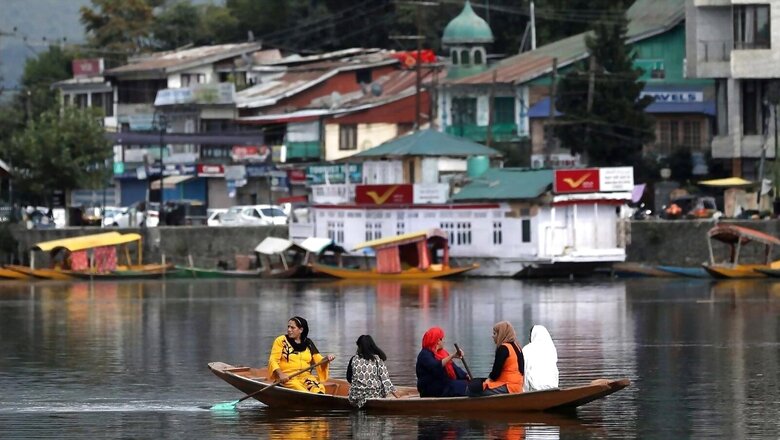
views
The three decades of violence in Kashmir have affected all important sources of livelihood of the local populace such as agriculture, horticulture, tourism, and the handicraft industry, with many traders having to shift their trading centres from the Valley to other parts of the country and others forced to look for alternative sources of income to survive the economic crisis.
Hartals had impacted agriculture, the primary sector of the region, badly. The contribution of the agriculture sector to the Gross State Domestic Product (GSDP) has remained poor. More than 60% of employment is based on this primary sector. This means there has been an imbalance between the average incomes of agriculturists and non-agriculturists, which in essence means that 60% people are becoming poorer.
One of the best things that happened in Kashmir after the abrogation of Article 370 sections is the restoration of administrative control. The work culture in government and semi-government departments was the immediate casualty with the onset of militancy. Frequent hartals and bandhs created havoc with the work culture as accountability and transparency in the functioning of the government were hit badly. During those three decades of militancy, corruption, nepotism, and favouritism were at their peak.
It took three decades for the people to understand that the series of hartals and violent scenes were worthless as they brought all sorts of miseries to them. Things took a new turn when Article 370 sections were abrogated and the region was brought under the direct control of the Centre. The government run by the lieutenant governor got engaged in rebuilding the Jammu and Kashmir region where accountability, transparency, and merit got priority. Finally, in 2022, we are witnessing major reforms taking place in the lives of a common Kashmiri.
The L-G-led government did a commendable job in restoring the confidence of the people in the administration of the union territory, as it brought accountability and transparency in functioning of all government and semi-government departments. Today we don’t see any administrative mess and all government functionaries are now engaged in rendering seamless services to the people in line with the envisaged rules.
Today there is a marked change in the situation. Normalcy has spread to the length and breadth of the Valley. All the businesses, government, and private offices, banks, schools, colleges, and universities are functioning normally.
When calendars of education were released in other states, in J&K, calendars of bandhs and hartals were issued. This practice has now been finished. As stated by the L-G: “From time to time earlier, peace was bought in Jammu and Kashmir. Now, we are not buying peace but making efforts to establish peace.”
Recent surveys conducted by media agencies suggested that the economy of Jammu and Kashmir has suffered a loss of Rs 60,000 crore ($9.2 billion) and has lost approximately around 3 years’ time of work and development. The region was considered unfit for any business venture and most of India Inc was bluntly refusing to invest here. This resulted in a high degree of unemployment here. It’s interesting to note that, “…Each individual in the Kashmir Valley has suffered an average loss of Rs 20 lakh ($30,000)”. In addition, according to the World Bank, Jammu and Kashmir was considered the worst place in India to do business.
Hartals in the Kashmir Valley, while invoking freedom of expression and the right to protest, more than often are anything but peaceful. Stone-pelting, threats, damage to public property and coercion are used in order to compel people to adhere to these hartals. This has had grave consequences for the economic, social, and psychological well-being of the region and its people.
Today people are fearlessly exercising their freedom of expression by not observing hartals and defying separatist calls. Now, economic development, an important stimulus to peace, and basic fundamental human rights like education, healthcare, employment, and the pursuit of happiness are no longer hostage to any political or violent radical ideology.
Read all the Latest India News here



















Comments
0 comment